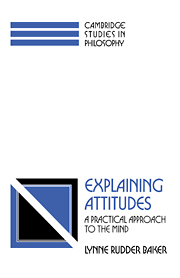
-
Select format
-
- Publisher:
- Cambridge University Press
- Publication date:
- 05 June 2012
- 27 January 1995
- ISBN:
- 9781139172622
- 9780521420532
- 9780521421904
- Dimensions:
- (216 x 138 mm)
- Weight & Pages:
- 0.421kg, 262 Pages
- Dimensions:
- (216 x 138 mm)
- Weight & Pages:
- 0.34kg, 264 Pages
You may already have access via personal or institutional login- Series:
- Cambridge Studies in Philosophy
Book description
Explaining Attitudes offers an important challenge to the dominant conception of belief found in the work of such philosophers as Dretske and Fodor. According to this dominant view beliefs, if they exist at all, are constituted by states of the brain. Lynne Rudder Baker rejects this view and replaces it with a quite different approach - practical realism. Seen from the perspective of practical realism, any argument that interprets beliefs as either brain states or states of immaterial souls is a 'non-starter'. Practical realism takes beliefs to be states of the whole persons, rather like states of health. What a person believes is determined by what a person would do, say and think in various circumstances. Thus beliefs and other attitudes are interwoven into an integrated, commonsensical conception of reality.
Reviews
"The discussions are always interesting, and at times profound and foundational. It provides a contrasting voice in an otherwise too one-sided discussion; everyone now working in the philosophy of mind should read it." Anne Jasp Jacobson, Canadian Philosophical Review
Contents
Metrics
Full text views
Full text views help Loading metrics...
Loading metrics...
* Views captured on Cambridge Core between #date#. This data will be updated every 24 hours.
Usage data cannot currently be displayed.
Accessibility standard: Unknown
Why this information is here
This section outlines the accessibility features of this content - including support for screen readers, full keyboard navigation and high-contrast display options. This may not be relevant for you.
Accessibility Information
Accessibility compliance for the PDF of this book is currently unknown and may be updated in the future.


